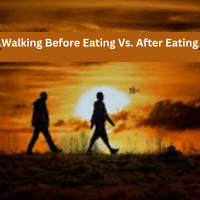Table of Contents
Walking Before Eating Vs. After Eating
Walking is one of the simplest and most effective ways to lose weight. Empty Stomach Walk vs. Post-Meal Walk, It’s accessible to nearly everyone, and it doesn’t require any special equipment. However, one common debate among fitness enthusiasts is whether walking on an empty stomach (fasted cardio) or after a meal is more effective for weight loss. Both approaches have their benefits, but which one is better for shedding those extra pounds? Let’s explore the pros and cons of each to help you decide which is best for your weight loss journey.
Benefits of Walking on an Empty Stomach
- Increased Fat Burning:
- Walking on an empty stomach, often referred to as fasted cardio, may increase the body’s ability to burn fat. Without readily available glucose from food, your body may turn to stored fat for energy, potentially leading to greater fat loss over time.
- Enhanced Hormonal Response:
- Fasted walking may boost levels of hormones like adrenaline and norepinephrine, which can enhance fat breakdown and increase metabolism. This hormonal response can contribute to more efficient fat loss, especially when combined with a healthy diet.
- Improved Insulin Sensitivity:
- Walking on an empty stomach may improve insulin sensitivity, which is crucial for weight loss. Better insulin sensitivity means your body can more effectively use glucose, reducing the risk of storing it as fat.
- Convenience:
- For many people, walking first thing in the morning on an empty stomach is convenient and helps kickstart their day. It’s a simple way to fit exercise into your routine without having to plan around meals.
Drawbacks of Walking on an Empty Stomach
- Lower Energy Levels:
- Without food to fuel your walk, you might feel less energetic, which could lead to a shorter or less intense workout. This may reduce the overall calorie burn, potentially impacting weight loss results.
- Muscle Loss Risk:
- In a fasted state, your body may not only burn fat but also muscle for energy, especially if you’re doing longer walks or higher-intensity exercise. Preserving muscle mass is important for maintaining metabolism and achieving a toned physique.
- Not Suitable for Everyone:
- Walking on an empty stomach isn’t suitable for everyone, especially those with blood sugar issues or certain health conditions. It’s important to listen to your body and consult with a healthcare provider if you’re unsure.
Benefits of Walking After a Meal
- Improved Digestion:
- Walking after a meal, especially after dinner, aids digestion by stimulating the digestive system. This can help prevent bloating and promote better nutrient absorption, which is beneficial for overall health.
- Stable Energy Levels:
- With food in your system, you’re likely to have more energy for your walk, allowing you to maintain a steady pace and potentially extend the duration of your exercise. This can lead to a higher calorie burn.
- Blood Sugar Regulation:
- Post-meal walking can help regulate blood sugar levels by promoting glucose uptake by the muscles. This can prevent insulin spikes and reduce the likelihood of excess glucose being stored as fat.
- Convenience and Routine:
- Incorporating a walk after meals, particularly dinner, can become a part of your daily routine, making it easier to stay consistent with your exercise regimen.
Drawbacks of Walking After a Meal
- Potential Discomfort:
- Walking too soon after a large meal can cause discomfort, such as cramps, bloating, or indigestion. It’s usually best to wait 30 minutes to an hour after eating before going for a walk to avoid these issues.
- Lower Fat Burning Potential:
- After a meal, your body is more likely to use the glucose from the food for energy rather than tapping into fat stores. This might result in less fat burning compared to walking on an empty stomach.
Which is Better for Weight Loss?
The answer to whether walking on an empty stomach or after a meal is better for weight loss depends on your individual goals, preferences, and how your body responds. If your primary goal is to maximize fat burning, walking on an empty stomach might be more effective. However, if you prefer to have more energy during your walk and want to support digestion and blood sugar regulation, post-meal walking could be the better option.
Ultimately, consistency is key. The best approach is the one you can stick to regularly. Whether you choose to walk before breakfast or after dinner, the most important factor for weight loss is maintaining a routine that works for you.
